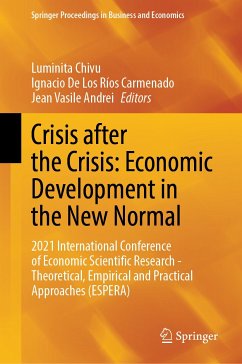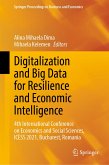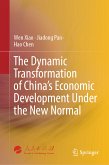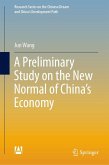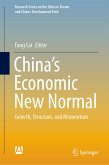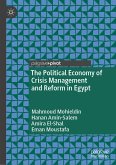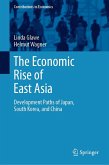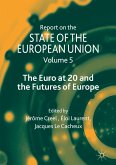Crisis after the Crisis: Economic Development in the New Normal (eBook, PDF)
2021 International Conference of Economic Scientific Research - Theoretical, Empirical and Practical Approaches (ESPERA)
Redaktion: Chivu, Luminita; Andrei, Jean Vasile; de Los Ríos Carmenado, Ignacio


Alle Infos zum eBook verschenken

Crisis after the Crisis: Economic Development in the New Normal (eBook, PDF)
2021 International Conference of Economic Scientific Research - Theoretical, Empirical and Practical Approaches (ESPERA)
Redaktion: Chivu, Luminita; Andrei, Jean Vasile; de Los Ríos Carmenado, Ignacio
- Format: PDF
- Merkliste
- Auf die Merkliste
- Bewerten Bewerten
- Teilen
- Produkt teilen
- Produkterinnerung
- Produkterinnerung

Hier können Sie sich einloggen

Bitte loggen Sie sich zunächst in Ihr Kundenkonto ein oder registrieren Sie sich bei bücher.de, um das eBook-Abo tolino select nutzen zu können.
This book presents economic research on global paradigm shifts after the COVID-19 crisis. It explores some expected deep and long-lasting changes that are building up a "new normal". Featuring select contributions presented at the 2021 International Conference of Economic Scientific Research - Theoretical, Empirical and Practical Approaches (ESPERA), this book explores topics such as digitalization and digital sovereignty, workforce management, virtual training, digital currency, de-carbonization in production processes, supply chains, cybersecurity, automation, artificial intelligence, machine learning, Internet of Things and blockchain technologies.…mehr
- Geräte: PC
- ohne Kopierschutz
- eBook Hilfe
- Größe: 13.15MB
![Digitalization and Big Data for Resilience and Economic Intelligence (eBook, PDF) Digitalization and Big Data for Resilience and Economic Intelligence (eBook, PDF)]() Digitalization and Big Data for Resilience and Economic Intelligence (eBook, PDF)161,95 €
Digitalization and Big Data for Resilience and Economic Intelligence (eBook, PDF)161,95 €![The Dynamic Transformation of China's Economic Development Under the New Normal (eBook, PDF) The Dynamic Transformation of China's Economic Development Under the New Normal (eBook, PDF)]() Wen XiaoThe Dynamic Transformation of China's Economic Development Under the New Normal (eBook, PDF)105,95 €
Wen XiaoThe Dynamic Transformation of China's Economic Development Under the New Normal (eBook, PDF)105,95 €![A Preliminary Study on the New Normal of China's Economy (eBook, PDF) A Preliminary Study on the New Normal of China's Economy (eBook, PDF)]() Jun WangA Preliminary Study on the New Normal of China's Economy (eBook, PDF)81,95 €
Jun WangA Preliminary Study on the New Normal of China's Economy (eBook, PDF)81,95 €![China's Economic New Normal (eBook, PDF) China's Economic New Normal (eBook, PDF)]() China's Economic New Normal (eBook, PDF)73,95 €
China's Economic New Normal (eBook, PDF)73,95 €![The Political Economy of Crisis Management and Reform in Egypt (eBook, PDF) The Political Economy of Crisis Management and Reform in Egypt (eBook, PDF)]() Mahmoud MohieldinThe Political Economy of Crisis Management and Reform in Egypt (eBook, PDF)32,95 €
Mahmoud MohieldinThe Political Economy of Crisis Management and Reform in Egypt (eBook, PDF)32,95 €![The Economic Rise of East Asia (eBook, PDF) The Economic Rise of East Asia (eBook, PDF)]() Linda GlaweThe Economic Rise of East Asia (eBook, PDF)53,95 €
Linda GlaweThe Economic Rise of East Asia (eBook, PDF)53,95 €![Report on the State of the European Union (eBook, PDF) Report on the State of the European Union (eBook, PDF)]() Report on the State of the European Union (eBook, PDF)73,95 €
Report on the State of the European Union (eBook, PDF)73,95 €-
-
-
Dieser Download kann aus rechtlichen Gründen nur mit Rechnungsadresse in A, B, BG, CY, CZ, D, DK, EW, E, FIN, F, GR, HR, H, IRL, I, LT, L, LR, M, NL, PL, P, R, S, SLO, SK ausgeliefert werden.
- Produktdetails
- Verlag: Springer International Publishing
- Seitenzahl: 412
- Erscheinungstermin: 26. August 2023
- Englisch
- ISBN-13: 9783031309960
- Artikelnr.: 68716498
- Verlag: Springer International Publishing
- Seitenzahl: 412
- Erscheinungstermin: 26. August 2023
- Englisch
- ISBN-13: 9783031309960
- Artikelnr.: 68716498
- Herstellerkennzeichnung Die Herstellerinformationen sind derzeit nicht verfügbar.
